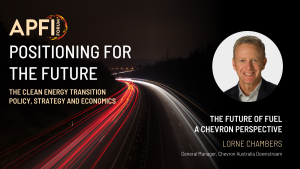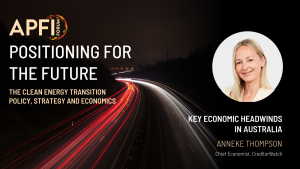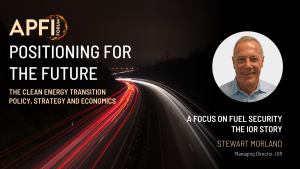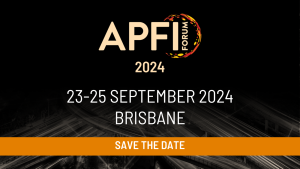The annual ACAPMA conference, the APFI Forum, was held in Brisbane last month. Feedback from delegates has been clear that, yet again, the program was packed with outstanding quality presentations that delivered the real knowledge dividend that the APFI is known for. The sessions covered a broad range of issues, challenges and opportunities facing the industry. In this Session Recap, we will explore the first session of the event – ‘The Clean Energy Transition: the policy, the strategy and the economics.’
Context
There is considerable uncertainty about the degree to which Net Zero 2050 and the associated low carbon mobility agenda will be delivered in practice. The challenge is no longer an environmental one as the national policy decision has been made. It is essentially an economic and engineering challenge of a magnitude and scale that has never been tackled in the modern world before.
An apolitical collaboration of Australian and overseas universities (the Net Zero 2050 Project) detailed the magnitude of the clean energy transition challenge in a recent report. The report, entitled How to Make Net Zero Happen in Australia, concluded that in order to achieve the Australian Governments 2050 goal of net zero, Australia needs to spend an additional $1.5 Trillion on the clean energy transition before 2030 – and an additional $6-$7 trillion by 2050.
The scale of the economic challenge highlighted in this report has been likened to the reconstruction of Europe after World War II.
The report raises a some very obvious questions for all of us. Can we afford the goals that have been set? If not, what is the alternative? Is the clean energy transition going to be a contest of ‘survival of the fittest’, with richer households able to afford the cost of the transition and continuing their normal lives while less wealthy households experience a decline in their standard of living as they grapple with the rising costs and limited availability of traditional forms of energy? Are there smarter alternatives to renewables (e.g. Nuclear)? What does this all mean for the businesses currently serving the transport energy needs (i.e. fuel and energy) of Australian households and businesses now?
Unfortunately, there are no easy answers to any of these questions. But one thing is for sure. The survival of our industry in the future will depend upon the degree to which we can successfully navigate the uncertainty associated with the sheer economic magnitude and societal cost of the Net Zero 2050 transition over the next 25 years or so.
Australia’s commitment to the realization of Net Zero by 2050, coupled with the long tail nature of our industry’s high-value fuel assets, means that this is not an industry conversation for later – it is a conversation for now.
“Our industry has too much invested to simply sit on the sidelines and watch the demand for our conventional products change. We must engage positively in this debate with traditional and non-traditional stakeholders to ensure that our businesses – and the more than 60,000 Australians that rely on them for their livelihood, survive and thrive in this new frontier”, said ACAPMA CEO Mark McKenzie.
“That is why this year’s Asia Pacific Fuel Industry Forum – ACAPMA’s annual industry conference – was advanced under the umbrella theme of “Positioning for the Future”, added Mark.
“The 2023 Forum sought to advance one of the most critical conversations our industry has faced in more than 60 years, namely: How best to adapt to the Net Zero 2050 agenda?”, concluded Mark.
Session recap
The Clean Energy Transition – the policy, the strategy and the economics
 Mr Lorne Chambers, General Manager for Chevron Downstream Australia, delighted delegates with a detailed exploration of the Chevron approach to future fuels. Which includes an absolute commitment to reducing emissions and pursuing multiple avenues and approaches, from hydrogen to synthetic fuels and everything in between.
Mr Lorne Chambers, General Manager for Chevron Downstream Australia, delighted delegates with a detailed exploration of the Chevron approach to future fuels. Which includes an absolute commitment to reducing emissions and pursuing multiple avenues and approaches, from hydrogen to synthetic fuels and everything in between.
Chevron Australia, proudly flying the Caltex star in Australia and around the world, is investing heavily in a future where traditional fuels are simply one part of a broader transport fuel offering to customers.
Lorne was generous and open with his presentation and continued to make himself available for comment and to answer the almost endless questions of delegates over the whole event.
Mr Chambers has graciously allowed the Encore Podcast of his presentation to be made available to all ACAPMAg subscribers, even if they missed out on being in the room for the APFI Forum 2023. See https://acapmag.com.au/2023/09/apfi-23-encore-podcast-the-future-of-fuel-a-chevron-perspective/ for more details.
 Ms Anneke Thompson, Chief Economist for CreditorWatch, led delegates through the often hidden datasets, particularly those that focus on SME business performance, and provided insight into what the clean energy transition means for the current and future economic performance of businesses in the downstream fuel and convenience industries.
Ms Anneke Thompson, Chief Economist for CreditorWatch, led delegates through the often hidden datasets, particularly those that focus on SME business performance, and provided insight into what the clean energy transition means for the current and future economic performance of businesses in the downstream fuel and convenience industries.
An Encore Podcast of Anneke’s presentation that pairs the slides with Anneke’s insightful commentary has been made available to all APFI 23 attendees now and will be made available on request to members from 1 November 2023.
 Mr Stewart Morland, Managing Director of Australian import and distribution business iOR, rounded out the session, providing delegates with a rare insight into the origin and future plans of this unique Australian business.
Mr Stewart Morland, Managing Director of Australian import and distribution business iOR, rounded out the session, providing delegates with a rare insight into the origin and future plans of this unique Australian business.
An Encore Podcast of Stewart’s presentation that pairs the videos and Stewart’s commentary has been made available to all APFI 23 attendees now and will be made available on request to members from 1 November 2023.
Wrap up
The delegates at the APFI 23 left the session with insight, energy and actionable intelligence that they could use in their business, heading straight out to a working morning tea visiting Business Partners before turning around for Session 2 – ‘Low Carbon Mobility: the opportunities and challenges.’
APFI 23 is all wrapped up but the APFI is heading back to Brisbane 23-25 September 2024.
Keep an eye out in ACAPMAg for more session recaps from the APFI 23.
Elisha Radwanowski BCom (HRM & IR)
ACAPMA






